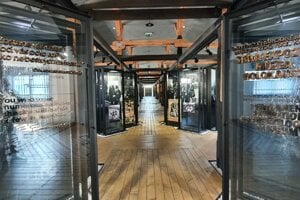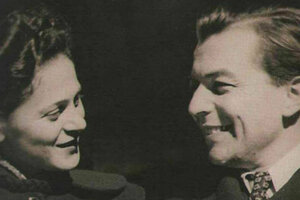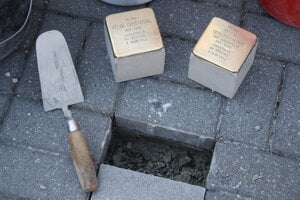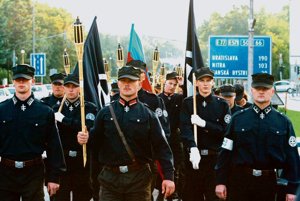Before the war, there were two shops in two towns located about 30 kilometres from each other in central Slovakia.
The shop in Brezno belonged to Hugo and Šarlota Mittelmann. The other one, in Ľubietová, was run by Viliam Berger and his wife Berta.
Who is Alica Frühwaldová?
Born in 1947 in Banská Bystrica, she studied Slovak and English as well as literature and worked as English teacher in Banská Bystrica between 1970 and 1991.
Between 1992 and 2006 she worked as the manager of the British Council. During this time, she accompanied Prince Charles when he was visiting Slovakia on November 1, 2000.
Later, she taught English at the Slovak Medical University in Banská Bystrica, she was a lector of English within EU projects and since 2017 she has lectured at the University of the Third Age of Matej Bel University in Banská Bystrica.
She has three children and six grandchildren.
Their granddaughter, Alica Frühwaldová, was born two years after the war ended. She never met any of her four grandparents. All were killed during the Second World War, when the Nazi-puppet Slovak state sent thousands of its Jewish citizens to extermination camps.
“My brother and I asked our parents from early childhood why we did not have grandparents, why we were not visiting their graves, but my parents found it hard to talk about,” Frühwaldová told The Slovak Spectator.
She lost her relatives and family before she was able to meet them. In her book The Love I Lost, she recounts what it is like to be a second generation of people falling victim to Nazi atrocities, and the pain and loss that followed in their wake.
Work exemption saved parents
Frühwaldová said she and her brother have known since they were little children that something in their family was “untraditional,” that there was something their parents did not want to talk about. Only when they were teenagers did they gradually learn the story of their family.
Their mother, Edita Mittelmannová by her maiden name, met her future husband when commuting to school to Banská Bystrica from Brezno. On a train, her eyes met with the eyes of Oskár Berger, who was travelling to a fur-trading business in Banská Bystrica where he was apprenticed. By the time they got married, the war had already started.
“I know now that this early September day in 1941 was the last time for the family to gather. My parents’ wedding day was to be the last day my relatives, all those whom I would never come to know, would be together,” Frühwaldová wrote in her book.
 Hard labour and threat of deportations. A museum shows the struggles of Slovak Jews Read more
Hard labour and threat of deportations. A museum shows the struggles of Slovak Jews Read more The first transports were dispatched from Slovakia soon after. Hugo Mittelmann was taken to Lublin in March 1942 and murdered in Treblinka, while Šarlota Mittelmannová and Alica Mittelmannová, Edita’s younger sister, were taken to Sobibor in June 1942 and were murdered. Some of their relatives were taken along with them.
Frühwaldová’s parents did not end on one of the transports thanks to the fact that her father married her mother and took her away from Brezno as they moved to Banská Bystrica. At a time when Jews were banned from working, as ordered by the Jewish Code approved on September 9, 1941, the director of the fur-business where Oskár Berger was working, Elena Slivková, applied for an official exemption for him.
Frühwaldová says that it was not an easy matter. Thousands of such applications were turned down every day. But her father received the license of “an economically significant Jew” in November 1941. This saved Berger and his wife from immediate deportation and allowed him to keep his job.
Hiding while pregnant in the woods
They were allowed to stay in town and keep working, but their life was far from enviable. They lived in a cellar flat together with their family members and witnessed how their relatives were taken away and put into a transport, up to a point when they were the last remaining inhabitants of the cellar.
The exemption Mrs Frühwaldová’s father possessed protected her parents until the Slovak National Uprising broke out in Banská Bystrica on August 29, 1944. Oskár Berger joined the forces and when the uprising was suppressed in October of 1944, he fled to the woods with his wife.
 I followed the Jewish boy who walked through the war in a police officer's old shoes Read more
I followed the Jewish boy who walked through the war in a police officer's old shoes Read more The young couple spent autumn, winter and spring in the woods. Frühwaldová describes how her parents were hiding with other families, how many other people were helping them, trying to find shelter for them and supplying them with food. In January 1945, Frühwaldová’s mother was four months pregnant.
Frühwaldová's story rarely mentions dates or specific days. Hiding in the woods, her parents normally did not know what day it was. Before the end of March 1945, people from the village of Ľubietová, who had been taking care of the Berger family and ten other people, came with the cheerful announcement that the war was over. Banská Bystrica was liberated on March 25, 1945.
Frühwaldová’s mother survived as the only one of her four-member family. Frühwaldová’s father had 11 siblings. Only two of them survived the war.
 I lost my sister in Auschwitz, Slovakia lost its future Read more
I lost my sister in Auschwitz, Slovakia lost its future Read more They returned to Banská Bystrica and on June 26, 1945, Frühwaldová’s older brother Ivo was born, the first Jewish child born in Banská Bystrica after the war.
The family changed their surname from Berger to Belan. They wanted to abandon their German surname, which resembled everything negative linked to the war.
First stumbling stones in Brezno
Frühwaldová acknowledged the help of local people who helped her parents and many others to survive.
“Every single case of a person who survived is often a miracle,” Frühwaldová said. “Those who were hiding in the mountains, or in shelters, were often able to do so only thanks to the help of people, and my parents were no exception. The courage [of the people who helped] is flabbergasting.”
Two families that Mrs Frühwaldová knows helped to save her parents, Milka Rafajová, birthname Čiefová, and the family of Ján Potančok, received the Righteous Among the Nations award for the non-Jews who took great risks to save Jews during the Holocaust. She said that their family stayed close to those people and their friendship lasted for many years.
Today, people visiting Brezno can stop in front of the former house of the Mittelmann family. It can be found at the site of today’s Tatra Banka. In front of the house there are three Stolpersteine, by German artist Gunter Demnig, who places “stumbling stones” at the sites where victims of the Nazi regime used to live before they were forced to enter concentration camps.
 “Stumbling stones” help remember Read more
“Stumbling stones” help remember Read more Three stones for Hugo Mittelmann, Šarlota Mittelmannová and their daughter Alica Mittelmanová, Frühwaldová’s aunt, were embedded in the pavement as the first ones ever in Slovakia in October 2012 by Demnig himself. Another one for Frühwaldová's great-grandmother should be installed soon.
Politicians forced her write book
Frühwaldová first thought of writing the story some 18 years ago. She said that it took her six to seven years to write, partly due to a break she took, when Marian Kotleba, chair of the far-right People’s Party Our Slovakia (ĽSNS), won the regional election in the Banská Bystrica Self-Governing Region in 2013. Kotleba spreads neo-Nazi symbols, for which he has been given a prison sentence, pending the ruling of the appelate court. He is also a known admirer of the wartime Slovak State.
 Judge explained to Kotleba why he is an extremist Read more
Judge explained to Kotleba why he is an extremist Read more Frühwaldová’s mother did not live to see it, but Frühwaldová remembers when members of Pospolitosť, Kotleba’s then party that was later disbanded by the Supreme Court because its political activities were in contradiction with the Slovak Constitution, marched the Slovak streets in uniforms. Those uniforms resembled the uniforms of the Hlinka Guard, a paramilitary organisation of Hlinka’s Slovak People’s Party, which became a representative of the Slovak State regime.
“My mother was crying, and I was crying with her,” Frühwaldová recalls. “She said she did not know that this would ever return. She feared for her children and grandchildren.”
This was the impetus for Frühwaldová to tell her family's story, because she did not know who might try to impact her grandchildren. But she stopped writing her book when Kotleba won the regional election in Banská Bystrica. His term was over in 2017,sitting in the opposition in parliament now.
“The feeling of fear from all of this still perseveres,” Frühwaldová said.
But there is another prevailing feeling she has about the story of her family. In many situations she remembers that she must manage something, because her mother did so and she was in a far worse situation. Or when she is about to renounce something, she says to herself that nobody asked her grandparents their opinion, that they were forced to leave everything behind and board the transport train.
“It may be a paradox, but the story of my family gives me unusual strength,” Frühwaldová summed up.









